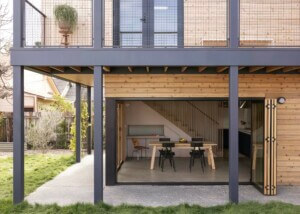Cities across the country are reckoning with an exponentially worsening housing crisis; prices continue to rise and the housing supply, at least in growing metropolitan regions, is failing to keep pace with demand. Much of the present predicament results from the ravages of the urban renewal era and restrictive zoning laws dating from that time. Mandates on building single-family homes and lots, that ubiquitous feature of the American landscape, serve to constrain the development of more affordable and denser urban areas and cement existing inequalities. So it is welcome news that Portland, Oregon, recently overturned a nearly century-old ban on several different types of homes. Substantial portions of the city are now open to the construction of accessory dwelling units (ADUs) and infill developments, as well as higher-density properties.
The legislation passed last August and has now come into effect a year later. It follows nearly a decade of advocacy from housing advocacy groups, and developers, across the city and is seen as a critical step in accomodating a projected population growth of approximately a quarter of a million by 2035 (the current population counts around 700,000); an untenable figure in a city where more than 70 percent residential land was zoned for single-family use.
The Sightline Institute, a think tank based in Seattle, recently dove into the implications of the new zoning code for the city of Portland. In the coming years, they suggest that new development will largely consist of stand-alone infill structures, or conjoined structures expanding the footprint and number of units of existing buildings. The think tank also noted that the construction of larger buildings, such as sixplexes, will likely have to wait until market forces warrant the higher price tag.
There are of course opponents to the legislation. As reported by the Portland Monthly, many residents view the scepter of development as a force for the demolition of existing structures and affordable housing, and their replacement with more expensive rental units. Similar complaints have been lodged against kindred initiatives in Minneapolis, Seattle, and Austin, all of which are attempting to address their booming populations with revamps in zoning.
The City of Portland is also pushing forward with its “Shelter-to-Housing Continuum Project,” which will enact code changes to facilitate the construction of single-room-occupancy housing and group living arrangements, allow the occupation of RVs or tiny houses on residential property, and promote flexible household living arrangments, amongst other objectives.











